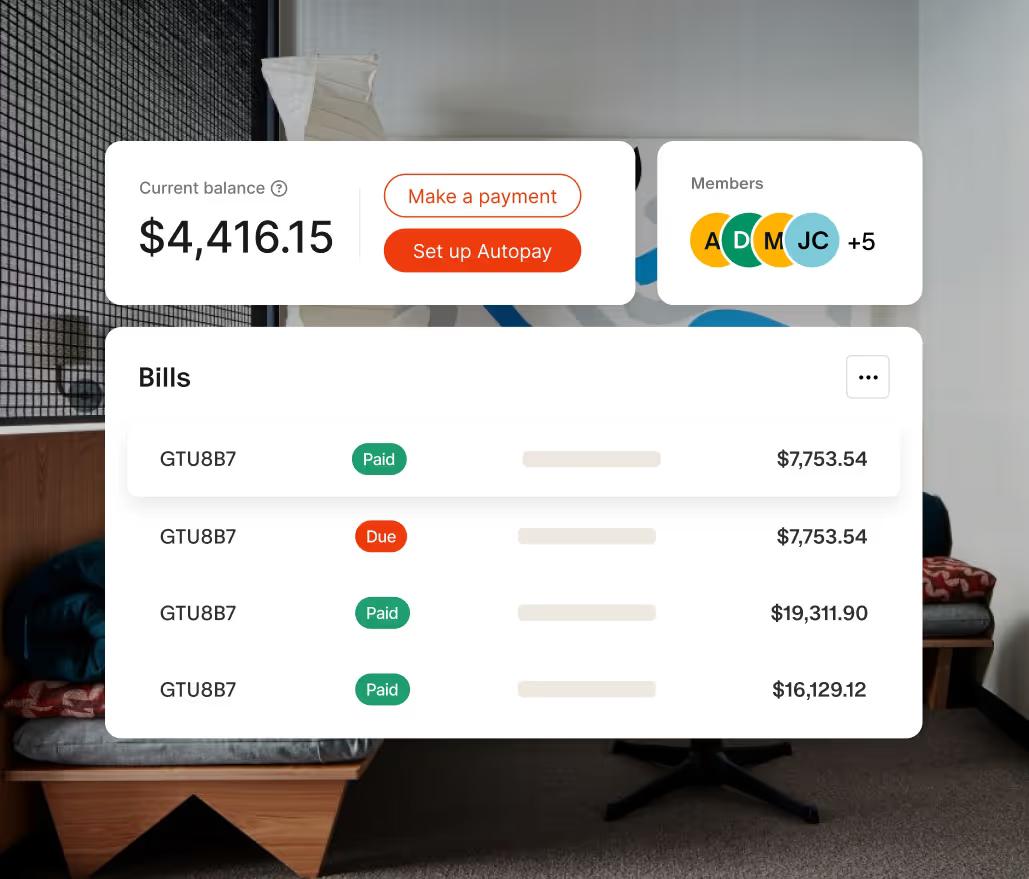What’s trip interruption insurance?

You booked the flight, lined up meetings, and maybe even planned a celebratory meal for closing the deal. Then, unexpectedly, a last-minute crisis derails your itinerary. Whether it’s a personal medical emergency or severe weather, these kinds of disruptions can turn a business trip into a logistical mess.
Trip interruption insurance helps cover the costs when plans go awry, recovering your money on flights, hotels, and other non-refundable travel expenses. In this guide, we’ll break down what’s covered (and what’s not), how much it typically costs, and how it differs from trip cancellation insurance. Although you can’t predict every travel hiccup, you can avoid letting one ruin your budget.
How does trip interruption insurance work?
Trip interruption insurance reimburses prepaid, non-refundable travel costs when you have to delay or cut short a trip. For businesses, this means salvaging your budget when last-minute disruptions complicate your travel plans.
Coverage varies by insurance policy, but here are some scenarios where trip interruption insurance might come in handy:
- Unexpected illness, injury, or death: The morning of your departure, you wake up with food poisoning, forcing you to postpone your travel plans. Insurance policies generally cover delays caused by you, your travel companion, or an immediate family member.
- Natural disaster: You’re en route to an important client meeting when a blizzard calls all flights, forcing you to rebook and extend your stay.
- A terrorist incident: You arrive at your destination, only to learn of a terrorist attack nearby, prompting an immediate return home for safety.
- Document theft: You realize your passport and visa were stolen, leaving you unable to board your return flight.
- Jury duty obligations: You’re ready to travel, but you get called for jury duty, forcing you to cancel your plans.
Coverage varies from one insurance policy to the next, with strict rules about what qualifies. Knowing the minute details of your insurance plan will save you from unexpected costs when plans go sideways.
What does trip interruption insurance cover and not cover?
Trip interruption insurance is a lifesaver for business travel managers. But it’s important to read the fine print and understand what it will—and won’t—cover.
What does trip interruption insurance cover?
From canceled flights and rebooking fees, a good insurance plan should provide the following trip interruption reimbursements.
Unused, pre-paid, and non-refundable trip expenses
If your trip is cut short, trip interruption insurance might reimburse you for the portion of your trip you couldn’t enjoy. This would include hotel stays, event tickets, and pre-paid activities that the vendor doesn’t refund directly.
Transportation costs
When you need to return home unexpectedly, the cost of rebooking flights or finding alternative transport piles up. Insurance can help cover these costs, so you’re not scrambling or settling for the least costly solution.
Missed flight connections
If a covered incident causes you to miss a connection, trip interruption insurance can cover the rebooking fees or alternative travel arrangements.
Extended hotel stays
When unforeseen circumstances force you to stay longer than planned, trip interruption insurance can cover modifications to hotel bookings. For example, if you fall ill and can’t travel home, your travel insurance might reimburse a few extra nights at your hotel while you recover.
What doesn’t trip interruption insurance cover?
Although trip interruption insurance provides a financial crutch for unexpected situations, it might not support everything. Here are some scenarios that even the best trip interruption insurance likely won’t cover.
Self-inflicted injuries or illnesses
If you cause your own injury or illness through reckless behavior, you won’t be reimbursed. For example, if you participate in an unscheduled, physically demanding team hike during a business retreat and sustain an injury, trip interruption insurance would likely not cover the cost of an extended hotel stay while you recover.
Travel delays due to foreseeable events
Insurance won’t cover interruptions caused by events that were known at the time you booked your trip—for instance, a forecasted hurricane or announced airline strike.
Work-related cancellations
If your boss asks you to return home early due to a change in business priorities, trip interruption insurance won’t cover the cost of rebooking. Travel insurance policies don’t provide reimbursements for changes driven by optional business decisions.
The cost of trip interruption insurance
Trip interruption insurance typically costs about 5–10% of the total cost of your trip. The final price of your travel insurance plan will vary based on a few factors that impact the level of coverage and specifics of your trip:
- Trip cost: Naturally, the more expensive your tip, the higher the insurance cost. A luxurious business conference in an international location will come with a higher premium than a quick domestic flight for an in-person client meet-up.
- Traveler age: Like regular health insurance policies, older travelers may face higher premiums due to an increased risk of illness or injury. Heightened risk may require extra coverage for medical evacuations or specialized care during the trip.
- Type of coverage: Travel managers can choose from a wide range of coverage. Extensive coverage, like reimbursements for medical emergencies or medical coverage for pre-existing conditions, will increase the travel insurance premium.
- Level of reimbursements: Some travel insurance plans cover up to 150%. For example, you may be reimbursed for a flight cancellation and an extra 50% for incidentals (transport or meals during your extended stay). Higher coverage provides extra financial protection, but expect your chosen travel insurance company to charge a higher premium.
Trip cancellation and trip interruption insurance: Main differences
Trip cancellation and trip interruption sound similar, but differ in the following ways.
Timing of coverage
Trip cancellation insurance covers everything before your trip begins, while trip interruption insurance kicks in once the trip begins.
Trigger events
Cancellation insurance protects you from unexpected events that prevent you from traveling, like an illness or natural disaster before departure. Interruption insurance plans cover changes or delays during the trip, like a medical emergency or unexpected travel delay.
Reimbursement focus
Cancellation insurance reimburses expenses incurred prior to a trip, like canceled flights and hotel bookings. Trip interruption insurance reimburses costs for the portions of the trip that change, like unused hotel stays or an extra day of a car rental due to severe weather.
Pros and cons of trip interruption insurance
Successful corporate travel policies balance comfort and cost. An extra line item on your budget sheet might seem like an unnecessary expense, especially if your trips tend to go off without a hitch. Here’s how to determine whether it’s a necessary expense for your business.
Pros of trip interruption insurance
Plans can change suddenly—your budget shouldn’t. Here are reasons why your business might want interruption or corporate travel insurance.
Protects business travelers from unforeseen changes
Business trips are often planned around tight schedules. Even the smallest unexpected event can throw everything off. Trip interruption insurance provides financial protection and flexibility against even the smallest disruption, making sure unused portions of the trip or extra incurred expenses don’t derail your budget.
Reimburses all unused expenses
Trip interruption insurance reimburses all unused, prepaid expenses, offering flexibility on flights, hotel bookings, and non-refundable activities. Whether you’re a multinational company with a comprehensive travel policy or a small business traveling on a budget, getting 100% of your incurred expenses back keeps your ledger intact.
Cons of trip interruption insurance
Of course, every travel interruption insurance policy has its drawbacks. Let’s take a look at a few limitations to be aware of.
Limited coverage for business-specific reasons
Business travel is packed with goals and opportunities like closing a big deal or networking with industry influencers. Unfortunately, trip interruption insurance won’t cushion the blow when your plans fall through due to business decisions. If a client gets cold feet and cancels a meeting at the last minute, the company covers the cost. Insurance only protects interruptions caused by external disruptions.
Added cost to business travel budgets
Even with its benefits, interruption insurance impacts your bottom line, and adding any kind of insurance to your travel expenses increases the overall cost of the trip. While a good policy can offer security, the added premium might be hard to justify, especially for short trips or those with few risks.
Manage your business trip flexibly with Engine
Business trips aren’t always predictable. Schedules shift, whether it’s extreme weather conditions or the opportunity to spend another day with an important client. That’s why flexibility should be built into your travel itinerary.
Engine’s travel management platform allows you to adjust hotel bookings with our Flex feature, giving you the coverage you need, no matter when or why your plans change. Plus, you can easily book flights, hotels, and car rentals all in one place.
You worry about closing the deal. Let us handle the travel details.




.avif)

.jpg)
.jpg)


.jpg)




.jpg)


















.avif)






